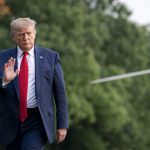Throughout history, comparisons between political figures often serve to reveal not only their character but also the prevailing sentiments of their time. Donald Trump, hailed by many as a savior of American interests, has earned himself a spot on the historical radar beside the likes of Andrew Jackson and William McKinley. Some historians now suggest that in his second term, Trump more closely resembles the latter.
Andrew Jackson might have been the first populist president who understood the art of stirring the masses against the elites, but Trump’s admiration for him is ironic. Jackson is often championed by the Democratic Party, and yet here sits Trump’s portrait in the Oval Office, a testament to how off-the-rails the left has gone. Historians like Jason Steinhauer argue that Trump’s real guiding star is William McKinley, who knew a thing or two about American dominance—something Trump and his advisors seem to embrace with gusto.
Trump on Presidents Day: More William McKinley than Andrew Jackson?https://t.co/9BipKzfRIO
— EarthWrite (@Americasgarden) February 17, 2025
Trump’s grand vision for America mirrors McKinley’s ambitions, focusing on expanding American power while keeping a frying pan-sized eye on the Western Hemisphere. From thoughts of annexing Greenland to claiming rights over the Panama Canal and Gaza, the Trump administration isn’t shy about reaching for global influence. They’ve even factored in the next frontier—outer space—where resource extraction and tourism could make Uncle Sam richer than ever. This plan isn’t just about boosting corporate profits; it’s a hopeful vision for trickle-down prosperity that harkens back to McKinley’s belief in America as the economic powerhouse of the world.
Tariffs are back in fashion, and Trump aims to retool how America collects revenue. It’s a tax strategy that flips the IRS on its head, proposing that the burden of taxation should fall on foreigners instead of the American worker. This pivot towards tariffs is designed to minimize domestic taxation, a strategy that would make a Libertarian proud. If Trump can significantly slash the federal budget and streamline the government, it could be the stepping stone to fulfilling the ultimate dream—eliminating the IRS entirely. McKinley, over 100 years ago, had strong words against “direct taxation,” perhaps hinting at the sentiment still felt today.
At the core of Trump’s political identity is a deep sense of grievance, believing that America gets shortchanged by the global system. From trade deficits to propping up the U.N. and NATO, Trump is keen on ensuring America isn’t taken for a ride. McKinley recognized the power of tariffs in leveling the playing field and aimed to secure American economic interests above all else, often engaging in international collaborations with a keen eye towards domestic benefit. The historical parallels drawn here reveal a consistent theme: leaders who fiercely advocate for their nation’s economic strength and security, even if it disrupts the international order.
However, one debate lingers over McKinley’s legacy. While Steinhauer touches on some controversial ideas associated with McKinley’s expansionist mindset, Trump’s appeal to minority voters and reluctance to engage in foreign wars sets him apart. Ultimately, the question of legacy may depend on one’s perspective, but the current administration’s ambitions show a clear desire to prioritize American interests above all, reminiscent of the bold moves made under McKinley’s watch.




